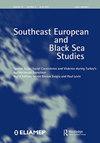Being small in a large club: unpacking Armenia’s actorness in the Eurasian Economic union
IF 0.8
2区 社会学
Q2 AREA STUDIES
引用次数: 0
Abstract
ABSTRACTThis article examines Armenia’s agency in the Eurasian Economic Union (EAEU). It argues that, despite being the smallest member and facing huge power asymmetry inside the organization, Armenia has been able to influence the decision-making in the EAEU in numerous ways. The research will examine three different strategies Armenia used to protect its interests: a) instrumentalizing the opportunities emanating from the institutional settings of the organization, b) negotiating exemptions from the EAEU legislation and securing core interests in the external relations of the union, and c) promoting specific ideas with the purpose of tailoring EAEU’s policy in a particular field to its economic needs.KEYWORDS: ArmeniaEurasian Economic Unionsmall statesdecision-makingintegration Disclosure statementNo potential conflict of interest was reported by the author(s).Notes1. The second reading of the amendment is pending, as of writing.2. To compare, the EAEU granted Kyrgyzstan and Kazakhstan 200 and 3500 exemptions, respectively (as cited in Dragneva and Wolczuk Citation2017, 22).3. In addition to Serbia and Iran, the EAEU membership provided Armenia with a more favourable access to major East and South-East Asian economies: the EAEU concluded FTAs with Singapore and Vietnam and the Agreement on Trade and Economic Cooperation with China (Eurasian Economic Commission Citation2023c, 3, 6–7).Additional informationFundingThe first phase of the research was conducted at the Center for Eastern European Studies at the University of Zurich as part of the fellowship program funded by the University of Zurich and the Federal Department of Foreign Affairs (FDFA) of Switzerland.Notes on contributorsErik DavtyanErik Davtyan is an Assistant Professor in the Department of International Relations and Diplomacy at Yerevan State University. His research interests include small state studies, regional politics in the South Caucasus, theories of international relations and foreign policy analysis. His articles have been published in peer-reviewed journals such as Caucasus Survey and Problems of Post-Communism.在大俱乐部里做小:在欧亚经济联盟中,亚美尼亚的角色
摘要本文考察了亚美尼亚在欧亚经济联盟中的作用。文章认为,尽管亚美尼亚是欧亚经济联盟中最小的成员,并且在组织内部面临巨大的权力不对称,但它能够以多种方式影响欧亚经济联盟的决策。该研究将研究亚美尼亚用于保护其利益的三种不同策略:a)利用组织机构设置产生的机会,b)谈判欧亚经济联盟立法豁免并确保联盟对外关系中的核心利益,以及c)促进具体想法,以使欧亚经济联盟的政策在特定领域适应其经济需求。关键词:亚美尼亚欧亚经济联盟小国决策一体化披露声明作者未报告潜在利益冲突。截至撰写时,修正案尚待二读。相比之下,欧亚经济联盟分别给予吉尔吉斯斯坦和哈萨克斯坦200和3500个豁免(参见Dragneva和Wolczuk引文2017,22)。除了塞尔维亚和伊朗,欧亚经济联盟的成员资格为亚美尼亚提供了更有利的进入东亚和东南亚主要经济体的机会:欧亚经济联盟与新加坡和越南签订了自由贸易协定,并与中国签订了贸易和经济合作协定(欧亚经济委员会Citation2023c, 3,6 - 7)。研究的第一阶段在苏黎世大学东欧研究中心进行,作为苏黎世大学和瑞士联邦外交部(FDFA)资助的奖学金项目的一部分。作者erik Davtyan是埃里温州立大学国际关系与外交系的助理教授。他的研究兴趣包括小国研究、南高加索地区政治、国际关系理论和外交政策分析。他的文章曾发表在《高加索调查》和《后共产主义问题》等同行评议期刊上。
本文章由计算机程序翻译,如有差异,请以英文原文为准。
求助全文
约1分钟内获得全文
求助全文
来源期刊

Southeast European and Black Sea Studies
AREA STUDIES-
CiteScore
3.00
自引率
19.00%
发文量
73
期刊介绍:
The aim of the journal is to establish a line of communication with these regions of Europe. Previously isolated from the European mainstream, the Balkan and Black Sea regions are in need of serious comparative study as are the individual countries, no longer "at the edge" of Europe. The principal disciplines covered by the journal are politics, political economy, international relations and modern history; other disciplinary approaches are accepted as appropriate. The journal will take both an academic and also a more practical policy-oriented approach and hopes to compensate for the serious information deficit on the countries under consideration.
 求助内容:
求助内容: 应助结果提醒方式:
应助结果提醒方式:


